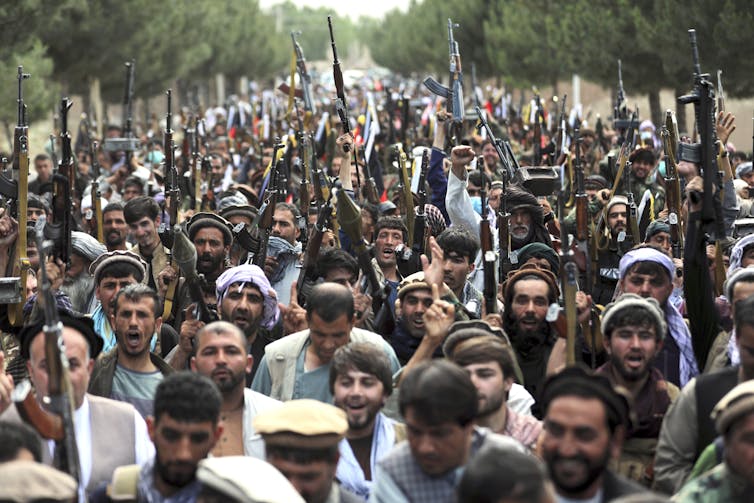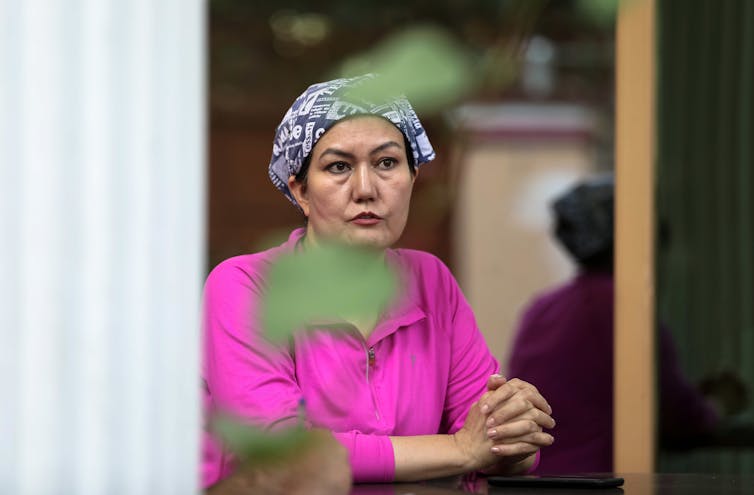As the Taliban returns, 20 years of progress for women looks set to disappear overnight
- Written by Azadah Raz Mohammad, PhD student, The University of Melbourne
As the Taliban takes control[1] of the country, Afghanistan has again become an extremely dangerous place[2] to be a woman.
Even before the fall of Kabul on Sunday, the situation was rapidly deteriorating[3], exacerbated by the planned withdrawal of all foreign military personnel and declining international aid[4].
In the past few weeks alone, there have been many reports[5] of casualties and violence. Meanwhile, hundreds of thousands of people have fled their homes. The United Nations Refugee Agency says[6] about 80% of those who have fled since the end of May are women and children.
What does the return of the Taliban mean for women and girls?
The history of the Taliban
The Taliban took control of Afghanistan in 1996, enforcing harsh conditions[7] and rules following their strict interpretation of Islamic law.
 The Taliban have been taking back control of Afghanistan with the withdrawal of foreign troops.
Rahmut Gul/AP/AAP
The Taliban have been taking back control of Afghanistan with the withdrawal of foreign troops.
Rahmut Gul/AP/AAP
Under their rule, women had to[8] cover themselves and only leave the house in the company of a male relative. The Taliban also banned girls from attending school, and women from working outside the home. They were also banned from voting.
Women were subject to cruel punishments for disobeying these rules, including being beaten and flogged, and stoned to death if found guilty of adultery. Afghanistan had the highest maternal morality rate[9] in the world.
The past 20 years
With the fall of the Taliban in 2001, the situation for women and girls vastly improved, although these gains were partial and fragile.
Women now hold positions as ambassadors, ministers, governors, and police and security force members. In 2003, the new government ratified the Convention on the Elimination of all Forms of Discrimination Against Women, which requires states to incorporate gender equality into their domestic law.
Read more: Afghan government collapses and Taliban on verge of controlling country: 5 essential reads[10]
The 2004 Afghan Constitution holds that “citizens of Afghanistan, man and woman, have equal rights and duties before the law”. Meanwhile, a 2009 law[11] was introduced to protect women from forced and under-age marriage, and violence.
According to Human Rights Watch, the law saw a rise[12] in the reporting, investigation and, to a lesser extent, conviction, of violent crimes against women and girls.
While the country has gone from having almost no girls at school to tens of thousands at university[13], the progress has been slow and unstable. UNICEF reports[14] of the 3.7 million Afghan children out of school some 60% are girls.
A return to dark days
Officially, Taliban leaders have said[15] they want to grant women’s rights “according to Islam”. But this has been met with great scepticism, including by women leaders in Afghanistan. Indeed, the Taliban has given every indication they will reimpose their repressive regime.
In July, the United Nations reported [16] the number of women and girls killed and injured in the first six months of the year nearly doubled compared to the same period the year before.
In the areas again under Taliban control[17], girls have been banned from school and their freedom of movement restricted. There have also been reports[18] of forced marriages.
 Afghan women and human rights groups have been sounding the alarm over the Taliban’s return.
Hedayatullah Amid/EPA/AAP
Afghan women and human rights groups have been sounding the alarm over the Taliban’s return.
Hedayatullah Amid/EPA/AAP
Women are putting burqas back on and speak of destroying evidence[19] of their education and life outside the home to protect themselves from the Taliban.
As one anonymous Afghan woman writes[20] in The Guardian:
I did not expect that we would be deprived of all our basic rights again and travel back to 20 years ago. That after 20 years of fighting for our rights and freedom, we should be hunting for burqas and hiding our identity.
Many Afghans are angered by the return of the Taliban and what they see as their abandonment by the international community. There have been protests in the streets[21]. Women have even taken up guns[22] in a rare show of defiance.
But this alone will not be enough to protect women and girls.
The world looks the other way
Currently, the US and its allies are engaged in frantic rescue operations[23] to get their citizens and staff out of Afghanistan. But what of Afghan citizens and their future?
US President Joe Biden remains largely unmoved by the Taliban’s advance and the worsening humanitarian crisis. In an August 14 statement[24], he said:
an endless American presence in the middle of another country’s civil conflict was not acceptable to me.
And yet, the US and its allies — including Australia — went to Afghanistan 20 years ago on the premise[25] of removing the Taliban and protecting women’s rights. However, most Afghans do not believe[26] they have experienced peace in their lifetimes.
Read more: Taliban 'has not changed,' say women facing subjugation in areas of Afghanistan under its extremist rule[27]
As the Taliban reassert complete control over the country, the achievements of the past 20 years, especially those made to protect women’s rights and equality, are at risk if the international community once again abandons Afghanistan.
Women and girls are pleading for help[28] as the Taliban advance. We hope the world will listen.
References
- ^ takes control (www.aljazeera.com)
- ^ dangerous place (time.com)
- ^ rapidly deteriorating (www.hrw.org)
- ^ international aid (www.hrw.org)
- ^ many reports (www.wsj.com)
- ^ says (www.unhcr.org)
- ^ harsh conditions (www.amnesty.org.uk)
- ^ women had to (www.amnesty.org.uk)
- ^ maternal morality rate (data.worldbank.org)
- ^ Afghan government collapses and Taliban on verge of controlling country: 5 essential reads (theconversation.com)
- ^ 2009 law (www.ilo.org)
- ^ rise (www.hrw.org)
- ^ university (blogs.worldbank.org)
- ^ reports (www.unicef.org)
- ^ have said (theconversation.com)
- ^ reported (unama.unmissions.org)
- ^ under Taliban control (www.theguardian.com)
- ^ reports (www.wsj.com)
- ^ destroying evidence (www.theguardian.com)
- ^ writes (www.theguardian.com)
- ^ protests in the streets (www.aljazeera.com)
- ^ taken up guns (www.theguardian.com)
- ^ frantic rescue operations (theconversation.com)
- ^ statement (www.whitehouse.gov)
- ^ premise (www.washingtonpost.com)
- ^ believe (www.aihrc.org.af)
- ^ Taliban 'has not changed,' say women facing subjugation in areas of Afghanistan under its extremist rule (theconversation.com)
- ^ pleading for help (www.bbc.com)

















